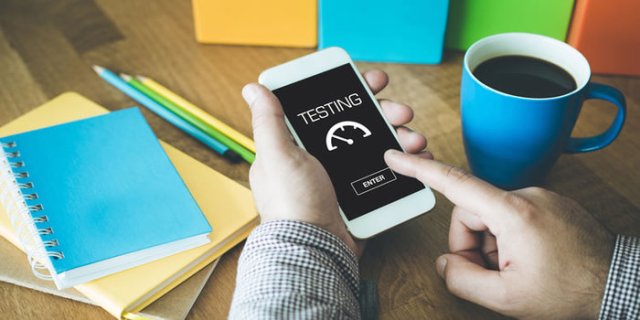Mobile applications have grown remarkably fast in recent years. And guess what is the core reason behind this success? Undoubtedly, the benefits it offers to business and end users. The progress has been unstoppable and many latest innovations have been directly involved in it. Studies have shown business are growing with the usage of mobile applications in comparison to those avoiding it.

As the benefits of mobile app increase, so does the competition: everyone is looking for a more advanced and effective app. The major task is to keep pace with the rapidly advancing industry. With so many parameters, it becomes a challenging job for Mobile app testing services to test a mobile application in all possible scenarios.
1. Networks
This factor is crucial for an application to perform better and satisfy user needs. Wi-Fi speed, signal strength, and data download can leave a huge impact on the end user. Since all network service provider supports different amounts of data, it is crucial to test their speed. A tester should consider all these factors and check that the app works well with different networks. Testing in a real network helps to identify existing problems. A tester creates a platform, to test the operation of the application on a real device in different network conditions.
2. Screen Size
Today, there are plenty of mobile gadgets available with different screen sizes. It is quite challenging to test the application on every screen size. Testers who used to focus particularly on pixel perfect functionalities are now forced to give more time to screen responsive without changing the crucial elements. To ensure the user experience is top-class, regardless of the mobile screen, Mobile app development services change the layout structure of the app.
3. Testing Tools
Testing is very important for a mobile application and for this, plenty of tools available. Selecting the right one to meet the design necessities is a significant decision. The effectiveness of a mobile app will depend completely on its compatibility with automated testing. Most applications are developed for iOS and Android platform, but the list can go on like Windows & Firefox OS. A user device can be of any OS. Thus, it is better to go with a tool that supports the maximum number of potentially used OS platforms.
4. Artificial Intelligence
AI is an integral part of the testing and future of automated application testing. AI bots can create test cases, and generate test data automatically. These bots set a certain test target and data for the test input. People still opt for traditional testing approach and do not seek the support of the bots with AI, but experts reveal that artificial intelligence is a key parameter to enhance the power of automated mobile testing.
There are plenty of reasons behind a mobile application success like brilliant research, skilled developers, the latest technology, and proper testing. No matter what the developers, promoters, and managers work, without proper testing, everything can fall flat. If you are hoping for your application to reach maximum users, but the app lacks proper testing, the chances of your success are narrow.
Conclusion:
Testing allows to identify all the loopholes in the application, enhance its usability, performance, and increase personalization factor for commercial success. We hope that this blog has provided you relevant details of the challenges faced by the testers. You should contact mobile app development services provider to get a dedicated mobile app for your business. This will definitely help in growing your business.